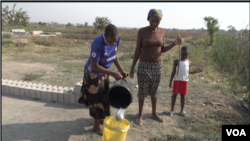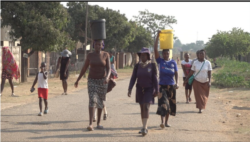Zimbabwe's capital has closed its water plant due to lack of funds to purchase water treatment chemicals, forcing residents to rely on open and untreated water sources.
Grace Kufakunesu, a 38-year-old mother of three, says she has been relying on open water sources for her household chores for months.
"Authorities have never informed us about what is causing these water cuts," she said. "We just see our taps without water. We go to the streams to fetch water for bathing, sometimes you end up using it for cooking, since you won't be having any clean water. Boreholes are few, plus there are long queues, so the little clean water we have we use it for drinking. The tap water we have — sometimes if you fill it in a container, you can see dirty stuff, so people are always complaining of stomach bugs."
The city of Harare blames erratic water supplies on the drought.
Michael Chideme, city of Harare spokesman, confirmed to VOA that Zimbabwe's capital had stopped purifying water because it was struggling to import water treatment chemicals.
"What happens is on our side, our budget for water is now exhausted," Chideme said. "We have approached [the] government to appraise [the] government of the need to support the water sector, to declare it an emergency so that funding partners can also come onboard and assist the city in the long-term projects."
For years, rights groups have accused the government of prioritizing matters such as foreign trips and luxury vehicles for senior officials, neglecting issues like health care, education and water supplies.
In 2008, lack of water treatment chemicals resulted in about 5,000 deaths from cholera. It was only after the intervention of U.N. agencies, the U.S. Agency for International Development, and the European Union that the disease was contained.
Now with the water plant closed in Harare, residents of the capital fear that might happen again.






